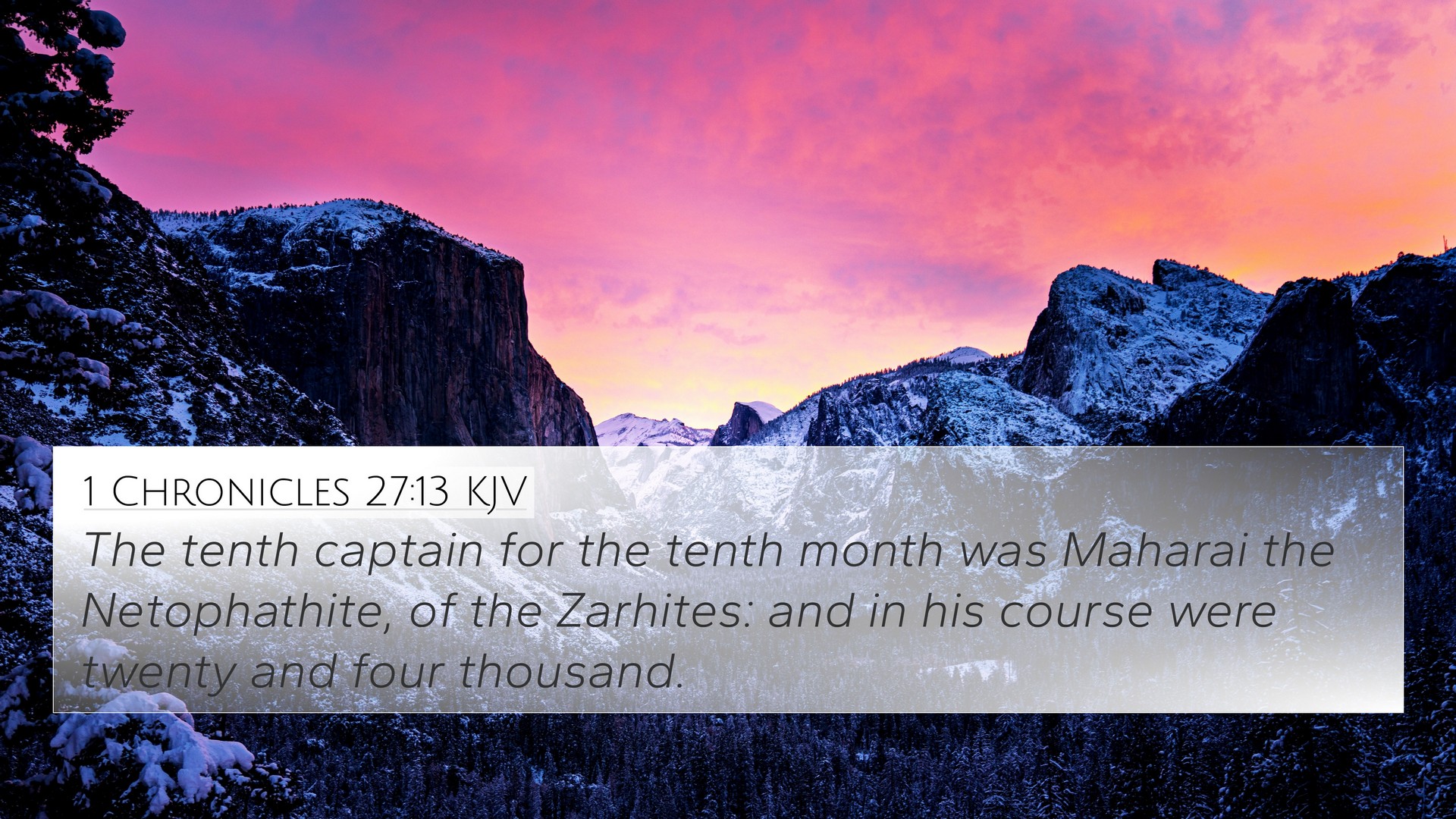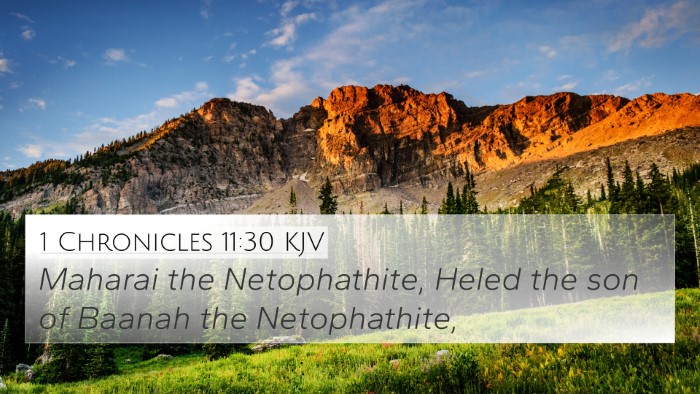Understanding 1 Chronicles 27:13
Verse: 1 Chronicles 27:13 - "The seventh captain for the seventh month was Helez the Pelonite of the children of Ephraim: and in his course were twenty and four thousand."
Summary of 1 Chronicles 27:13
1 Chronicles 27:13 presents the organized military structure that King David implemented to manage his kingdom effectively. This particular verse highlights Helez the Pelonite, a commander from the tribe of Ephraim, who led a division of 24,000 men during the seventh month of the year. The recounting of this military appointment underscores David's strategic approach to governance, emphasizing order, responsibility, and the importance of leadership in the realm.
Insights from Public Domain Commentaries
Matthew Henry
Matthew Henry notes that this list of military captains demonstrates the organization necessary for David’s reign. He emphasizes that such systematic governance ensures both readiness for battle and the safety of the nation. Each captain being responsible for a month indicates not just periodic duty but also continuous vigilance, reflecting God's providence in appointing leaders according to their tribes.
Albert Barnes
Albert Barnes elaborates on the significance of the division of the army in this verse. He connects it to the broader theme of accountability and preparation in leadership roles. Helez, coming from Ephraim, also signifies the inclusion of diverse tribes in the military leadership, thus establishing unity among the Israelites under David’s reign.
Adam Clarke
Adam Clarke provides a context for the tribal representation in David's military structure, pointing out that such details illustrate the importance of various tribes contributing to the security of the nation. Clarke highlights that the Ephraimites were significant in military terms, echoing their historical relevance in Israel’s history.
Bible Cross-References
- 1 Chronicles 12:27-28: Discusses the warriors who came to David and their tribal representations.
- 2 Samuel 23:26: Provides insights on notable warriors, paralleling the military leadership reflected in Chronicles.
- 1 Chronicles 11:10: Affirms David's might and the importance of leaders among the people.
- 1 Chronicles 28:1: References the gathering of military leaders, emphasizing the significance of organized structure.
- Exodus 18:21: Highlights the selection of able men as leaders, similar to the appointments made by David.
- 1 Timothy 3:1-2: Discusses the qualities required for leadership, which can be compared with David's military officers.
- Joshua 17:10: Connects to the tribal geography and military engagement of Ephraim.
- Psalm 144:1: Speaks to David's understanding of leadership and military might.
- Hebrews 11:32-34: Mentions David and military leadership, reflecting back on the valor required in governmental positions.
- 1 Chronicles 21:5: Provides more details on military numbers, reinforcing the theme of organized leadership.
Thematic Connections Between Bible Verses
This verse, while focusing on the specific appointment of Helez the Pelonite, shows thematic connections to:
- Divine order: Emphasizing God's sovereignty in structuring governance.
- Leadership: Drawing parallels between David's appointment of leaders and contemporary views on leadership virtues as seen in the New Testament.
- Unity among tribes: Reflecting how diversity in leadership enhances national strength.
Cross-Referencing Bible Study
For those seeking to deepen their understanding of the Bible through cross-referencing, 1 Chronicles 27:13 serves as a valuable text. Here are some methods and tools for effective cross-referencing:
- Utilize a Bible concordance to look up significant names and terms that appear in this verse.
- Employ a cross-reference Bible study technique by tracing leaders and military organization across the Old and New Testament.
- Identify connections between Bible verses to uncover thematic unity in leadership.
- Engage in comparative Bible verse analysis by examining the differences and similarities between David’s military and other biblical leadership instances.
- Make use of a Bible cross-reference guide to follow additional themes outlined in Chronicles.
Conclusion
Understanding 1 Chronicles 27:13 is not merely about knowing the name of Helez the Pelonite, but recognizing the order and responsibility that comes with leadership. This verse connects to numerous others, illustrating the importance of structure in governance and the fruitful outcome of divinely appointed leaders that serve within Israel’s history.
Further Study Suggestions
For enriched study, consider exploring:
- Historical significance of each tribal leader and their contributions.
- How David's military organization influenced future leaders and military structures in Israel.
- The role of Ephraim in Israel's history as reflected in both Chronicles and the prophecies.




